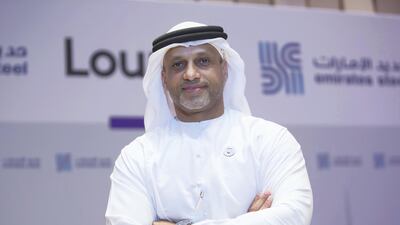Emirates Steel has increased its sales to the US over the last year despite a 25 per cent metal tariff, and the company aims to boost its market share in South America, Iraq and Syria, a company official said.
"Three per cent of our total sales of sections goes to the US. We increased our sales to the US despite the 25 per cent duty that was imposed in 2018,” Mohammed Al Afari, Emirates Steel, vice president, sales told reporters in Abu Dhabi on Tuesday. "In terms of US imports of our steel, [they] import 600,000 tonnes [a year] of steel sections."
The company aimed to increase total sales to the US to around five per cent this year, he added.
The US administration under President Donald Trump last year imposed a 25 per cent tariff on all imported steel to contain what he called “dumping” of the base metal by largely Chinese manufacturers. Imposition of tariffs against metals and doubling of levies on Turkey's steel and aluminium exports by the US, has led to a global slump in the base metals market.
Emirates Steel, one of the UAE’s largest non-oil companies, anticipates a largely challenging year with expected slowdown in the construction sector, surge in prices for iron ore, drop in sales prices, market volatility and protectionism, according to its chief executive Saeed Al Remeithi.
The company would aim to increase sales revenues by reducing "direct and indirect costs,” he added.
A deadlock in discussions between the US and China over resolution of their trade war would set up “uncertainties for the whole world”, said the chief executive.
“Rise [in] duties on imported [steel] will indirectly affect everyone,” said Mr Al Remeithi.
Emirates Steel, a subsidiary of Abu Dhabi industrial holding company Senaat, announced a 15 per cent increase in revenues in 2018, generating Dh7.5 billion.
In order to mitigate the effects of protectionism on the industry, the company will look to enter new markets such as Latin America.
"We always try to find a substitute market where we can sell our products. South America is one of the markets for us. Recently we’ve established Colombia as a market,” said Mr Al Afari.
The company, which counts the GCC as its biggest market, will look to hold its cards closer to the region and will look to tap into opportunities emerging in countries such as Iraq and Syria.
Emirates Steel has already sold small volumes in the Iraqi market and has plans to increase exports, Mr Al Remeithi told The National.
Ongoing reconstruction efforts in Syria following the retreat of the Islamic State also opened up opportunities for supply of steel.
“If the market opens up we need to be there, even though it’s a little bit far. It’s [also] closer to our competitors,” he added.
Last year, Emirates Steel manufactured 3.1 million tonnes of finished products, the same volume as 2017. Around 20 per cent of production was exported to some 40 countries, with the remainder absorbed by the domestic market.


